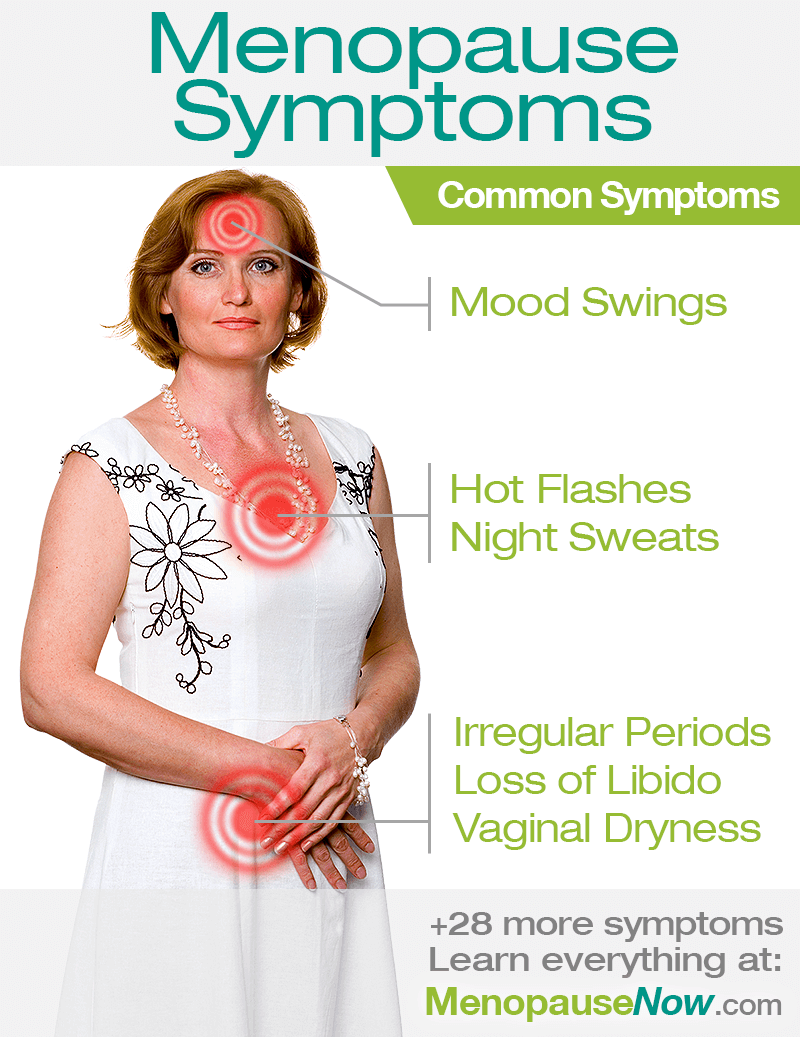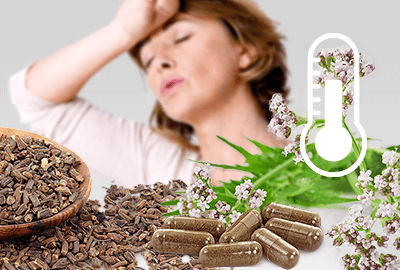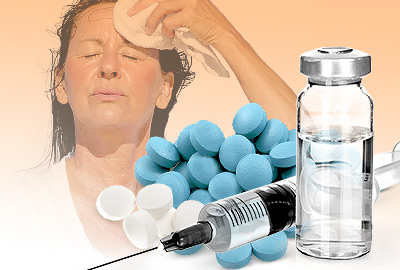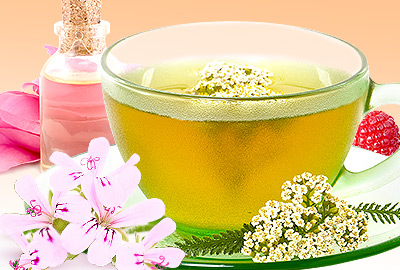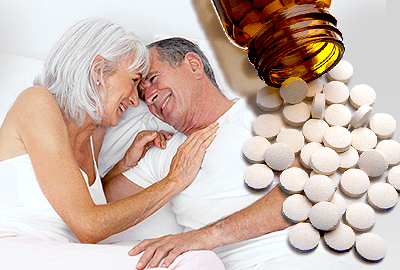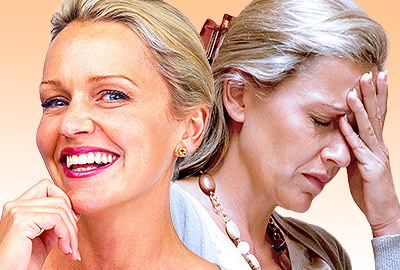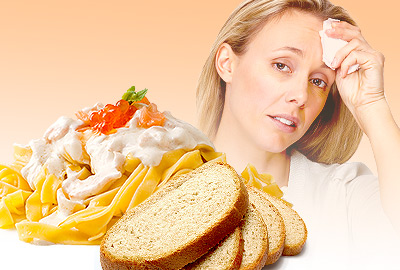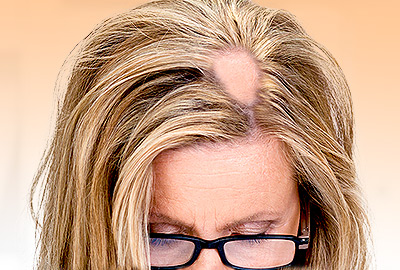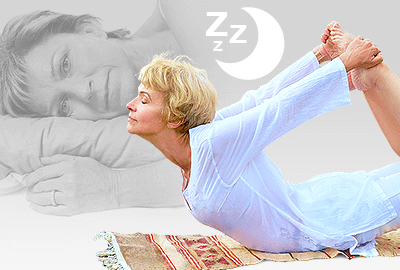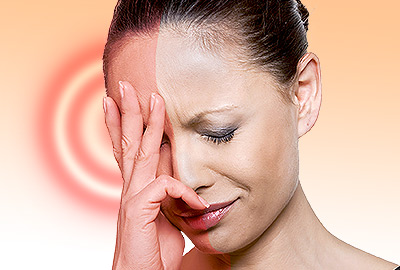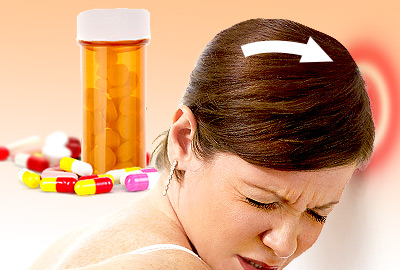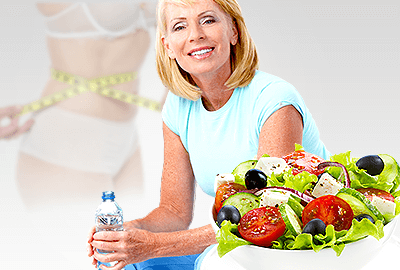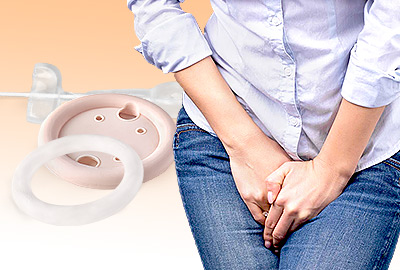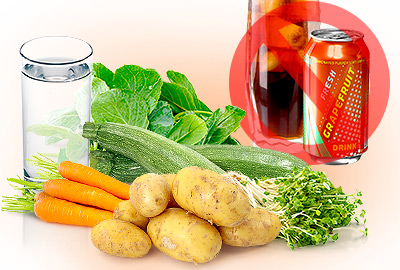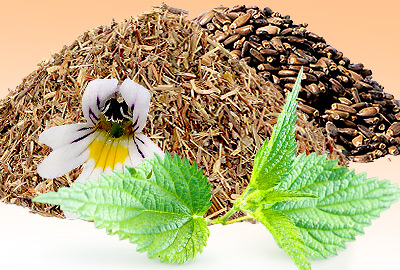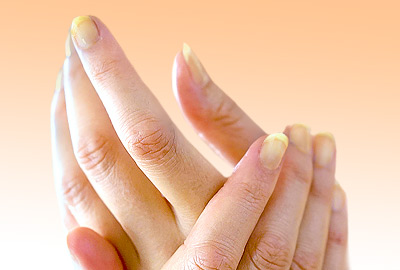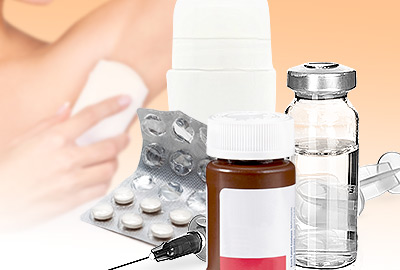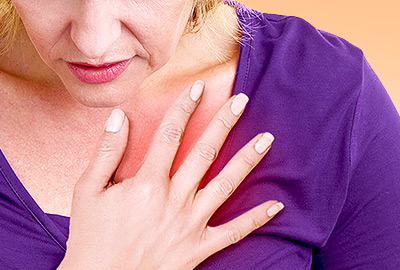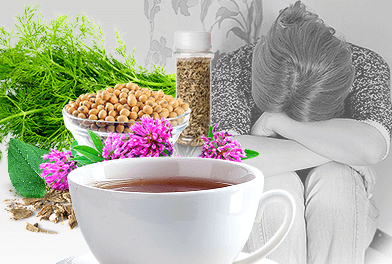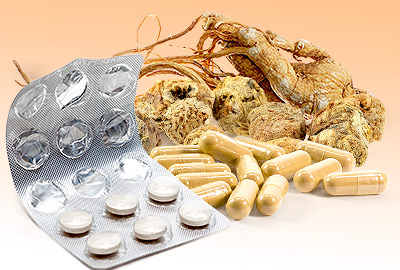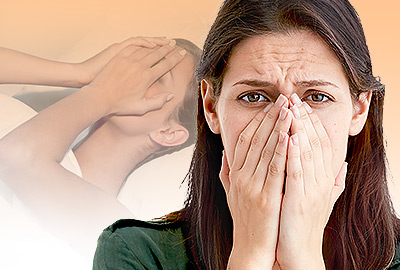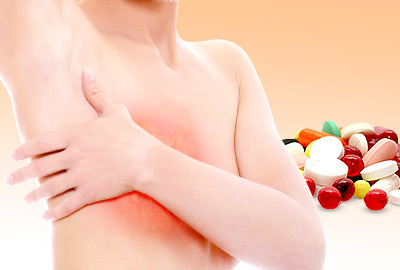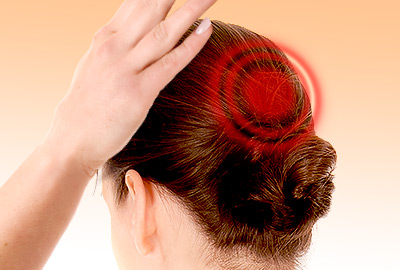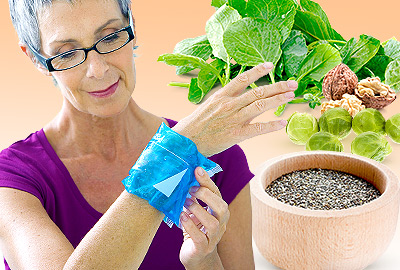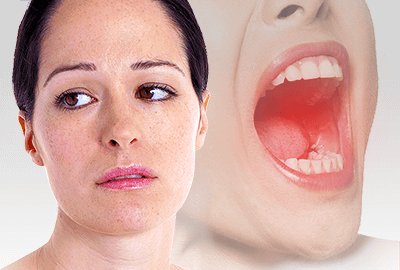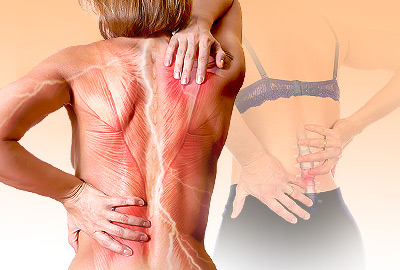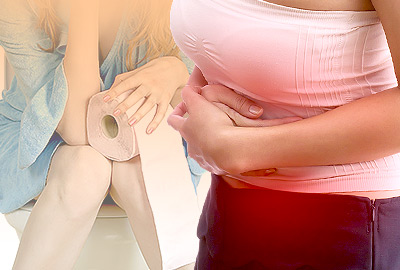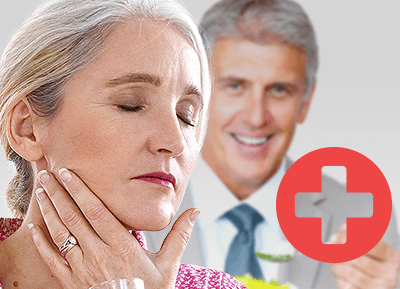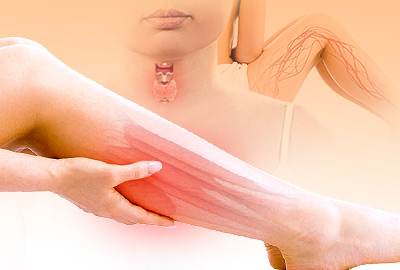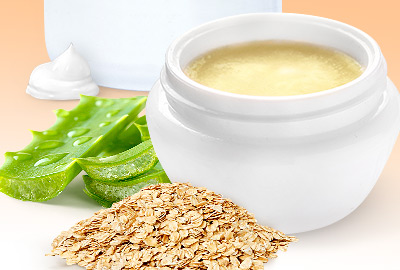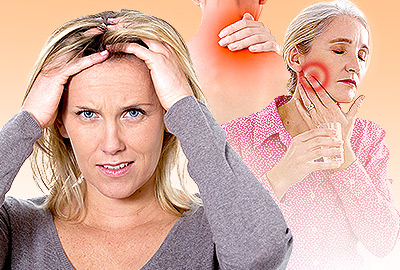Common Menopause Symptoms
Hot Flashes
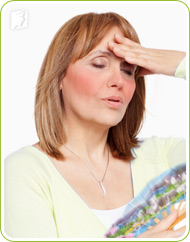
Hot flashes, also known as hot flushes, are sudden and brief sensations of heat spreading over the body, especially on the face and chest. Some women experience delicate flushes, while others feel as if they were being engulfed in flames. Oftentimes, hot flashes are also accompanied by chest palpitations, pressure in the head, and flushing.
Did You Know? Up to 85% of middle-aged women report experiencing hot flashes.
What to Do for Hot Flashes?
- Finding Relief: Opt for foods rich in phytoestrogens and vitamins C and E; exercise regularly in well-ventilated spaces, and practice yoga or deep-breathing exercises to moderate stress. Remember to wear loose, breathable, cotton clothes and to cool yourself down with icy drinks and cold showers.
- Treatment Options: You can relieve hot flash symptoms with alternative medicine, including phytoestrogenic and hormone-regulating supplements, or conventional medicine, such as hormone replacement therapy (HRT). Be cautious as HRT can cause serious side effects.
Night Sweats
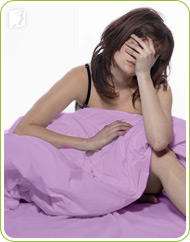
Night sweats, also called nocturnal hot flashes, are episodes of mild to profuse sweating during nighttime hours. They can range from mild to intense and evoke enough discomfort to disrupt a woman's sleep, affecting her functioning and mood the following day. They can also cause rapid heartbeat, flushing, and chills, which leads to further distress.
Did You Know? About three out of four menopausal women suffer from night sweats.
What to Do for Night Sweats?
- Finding Relief: Add phytoestrogenic and vitamin E-rich foods into your diet, and reduce stress with yoga or meditation. Also, keep your bedroom at cool temperatures, sleep in loose and breathable nightwear, and apply cold compresses to your body to cool down.
- Treatment Options: Treating night sweats is possible with alternative approaches, including natural supplements - like red clover, black cohosh, or Macafem - or conventional approaches, such as HRT (possible side effects).
Irregular Periods
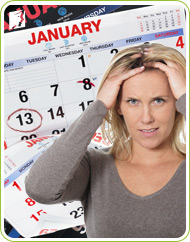
Irregular periods are any deviations from what is considered the norm for a woman, including having early or late periods, unusually heavy or light bleeding, and short or long cycles. Skipping periods and “spotting” - light bleeding between periods - are also common.
Did You Know? Irregular periods are often the first indication of approaching menopause among middle-aged women.
What to Do for Irregular Periods?
- Finding Relief: Load up on foods rich in phytoestrogens and omegas; exercise regularly to relieve stress and maintain a proper weight, and keep a monthly log of your period patterns. Quick pain relief is possible with herbal infusions and warm compresses.
- Treatment Options: Regulate your menstrual cycles naturally with herbal supplements - such as ginseng, soy, and Macafem - or conventionally with medications, such contraceptives and HRT (potential side effects), or surgery.
Loss of Libido
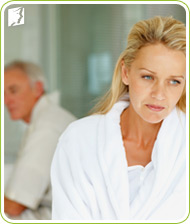
Although periodic peaks and valleys in sexual desire are normal throughout life, a sudden drop in desire or interest in sexual activity or intimacy can be troubling to many middle-aged women. Loss of libido might also be accompanied by low vaginal lubrication and painful intercourse.
Did You Know? Low libido affects up to 40% of women in their mid-40s.
What to Do for Loss of Libido?
- Finding Relief: Eat foods rich in phytoestrogens, zinc, and magnesium; practice Kegel exercises for improved vaginal muscles, and reduce stress with breathing exercises. Focus on frequent, non-coital intimacy to improve libido, and take advantage of natural lubricants and moisturizers.
- Treatment Options: You may alleviate low libido with natural approaches, including phytoestrogenic and hormone-regulating supplements, or conventional approaches, such as over-the-counter lubricants or HRT.
Vaginal Dryness
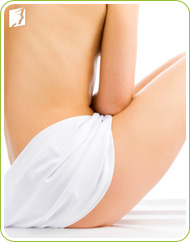
Vaginal dryness occurs when tissues in the vagina are not sufficiently lubricated, causing a woman personal distress and negatively affecting intimacy. Lack of vaginal lubrication can bring about discomfort, itchiness, and irritation, all of which increase the risk of infections. It can also lead to sex becoming uncomfortable or painful.
Did You Know? More than half of middle-aged women suffer from vaginal dryness.
What to Do for Vaginal Dryness?
- Finding Relief: Opt for a diet rich in phytoestrogenic foods and omega-3 fatty acids; avoid wearing synthetic underwear, and have intercourse regularly. Relieve itching and dryness with water-based lubricants, natural soaps, or aloe vera applications.
- Treatment Options: Treating vaginal dryness might consist of alternative methods, such as supplements promoting hormonal balance, or conventional methods - including medications, such as oral or vaginal HRT, or surgery.
Mood Swings
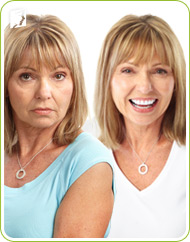
A woman experiencing mood swings may feel like she is on a rollercoaster of emotions: one minute she's euphoric, the next minute she's gloomy. These extreme and abrupt fluctuations in mood can also be worsened by other menopause symptoms, such as fatigue or sleeping problems.
Did You Know? Mood swings affect up to 75% of women going through the menopausal transition.
What to Do for Mood Swings?
- Finding Relief: Focus on a balanced diet rich in phytoestrogens; exercise regularly to increase endorphin release, and get good quality sleep to reduce stress. Try herbal infusions for relaxation, and create a supportive network of friends and family to help you get through this time.
- Treatment Options: Try balancing your hormones and reducing mood swings with natural medicine, including St. John's Wort, valerian, and Macafem. Or consider conventional methods, like psychotherapy, or medications, like anti-depressants or HRT (beware of side effects).
Changes
Fatigue
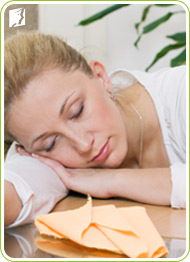
Fatigue is defined as an ongoing and persistent feeling or weakness, tiredness, and lack of energy. Often accompanied by irritability, sleeplessness, and concentration problems, fatigue can have a drastic impact on one's quality of life, putting strain on relationships, work productivity, and sense of well-being.
Did You Know? Up to 80% of women between the ages of 45 and 55 report fatigue symptoms.
What to Do for Fatigue?
- Finding Relief: Boost hormonal levels with phytoestrogenic foods and regular exercise; prevent stress accumulation with deep breathing and yoga, and maintain a regular wake-up and bedtime routine. Avoid heavy meals, smoking, and alcohol before going to sleep.
- Treatment Options: Treating fatigue is possible with alternative medicine, such as phytoestrogenic and hormone-regulating supplements, or conventional means - including physical therapy - or medications, like sleeping aids or HRT (potential side effects).
Hair Loss or Thinning
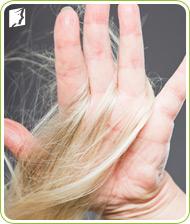
Hair loss or thinning, medically known as alopecia, is one of the most troubling menopause symptoms. It may manifest as thinning of the hair on the head and other parts of the body as well as becoming drier and more brittle. Hair loss can lead to various emotional issues among women, including low self-esteem.
Did You Know? Contrary to men, female hair loss mainly occurs along the part and causes general thinning.
What to Do for Hair Loss?
- Finding Relief: Consume a diet with phytoestrogenic foods, protein, and iron; maintain proper hydration, and reduce stress with breathing techniques. Also, avoid using curling irons and blow dryers; uphold healthy hair hygiene, and use herbal, sulfate-free hair products.
- Treatment Options: Treatments for hair loss include natural approaches, such as herbal supplements to obtain hormonal balance, or conventional approaches, including HRT (beware of side effects) or surgery.
Sleep Disorders
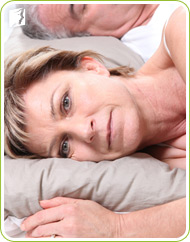
Waking many times during the night, tossing and turning, and insomnia are well known to women going through menopause. They often report that their sleep is less regenerative and that falling and staying asleep is a challenge. As a result, sleep disorders affect their daily functioning, mood, memory, and concentration.
Did You Know? There are over 70 recognized sleep disorders, including insomnia, sleep apnea, and more.
What to Do for Sleep Disorders?
- Finding Relief: Eat a diet rich in phytoestrogens; prevent stress accumulation with yoga and meditation, and exercise to boost hormones. To relax before bedtime, try calming herbal infusions. Also, avoid eating, caffeine, or smoking two hours before going to bed, or create a comfortable sleeping environment.
- Treatment Options: Alleviating sleeping problems is possible with alternative methods, such as hormone-boosting herbal supplements, or conventional methods, including prescription sleeping aids or HRT (look out for side effects).
Difficulty Concentrating

As women approach menopause, they often notice that they have trouble maintaining attention on everyday or complex tasks. Naturally, experiencing difficulty concentrating can be a source of great worry as it negatively impacts all aspects of their life.
Did You Know? Other menopause symptoms, like sleep problems or fatigue, can worsen a woman's concentration.
What to Do for Difficulty Concentrating?
- Finding Relief: Opt for a diet full of phytoestrogens, omegas, and vitamin B12; reduce stress with breathing techniques, and get a good night's sleep. To stay focused, keep a daily agenda, do memory games, and concentrate on completing one task at a time.
- Treatment Options: Concentration problems can be alleviated naturally with phytoestrogenic or hormone-balancing supplements in addition to conventionally with psychotherapy, prescription stimulants, or HRT (be careful of side effects).
Memory Lapses
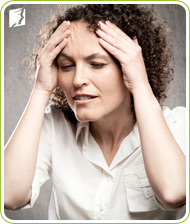
Misplaced car keys, forgotten birthdays, and lost trains of thought might seem like trivial occurrences, but these can be extremely distressing for middle-aged women who have never missed a beat before. Memory lapses make it harder for women to remember or recall information, an experience often described as having “brain fog.”
Did You Know? The key reproductive hormone, estrogen, plays an important role in language skills, verbal fluency, memory, attention, and more.
What to Do for Memory Lapses?
- Finding Relief: Load up on phytoestrogens, vitamin B12, and omega-3 fatty acids; exercise to improve mental sharpness, and practice yoga or visualization techniques to release stress. Support cognition by playing memory games, reading, or learning a new language.
- Treatment Options: Memory lapses can be approached with natural medicine, including herbal supplements for hormonal balance, or conventional methods, like psychotherapy, HRT (possible side effects), or medications for memory impairment.
Dizziness
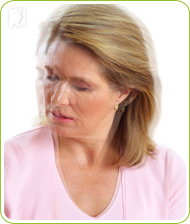
Dizziness is a transient sensation of lightheadedness or imbalance as well as an inability to maintain balance upon standing or while walking. Episodes of dizziness can last for as little as a few seconds, but can leave a woman feeling out of sorts for an extended period of time. They may even lead to falls, which can impact her daily home and work life.
Did You Know? Dizziness is one of the most common complaints for which American adults seek medical attention.
What to Do for Dizziness?
- Finding Relief: Eat regular meals rich in phytoestrogenic foods, omegas, and vitamins B, C, and E; exercise regularly to improve circulation, and practice stress-reduction techniques, like yoga. Remember to drink plenty of water, avoid sudden movements, or take frequent breaks during the day.
- Treatment Options: Treating dizziness might include herbal supplements, such as biloba, ginkgo, and Macafem, or conventional medications, such as anti-nauseates, anti-dizziness pills, or HRT (might cause side effects).
Weight Gain
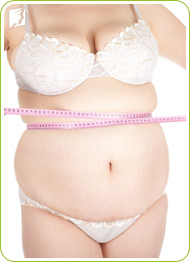
Weight gain during menopause is characterized by increased fat accumulation around the abdomen, as opposed to other parts of the body. Menopausal women with excess weight gain are a higher risk of heart disease and mental health issues, such as depression or anxiety.
Did You Know? Weight gain is said to affect up to 90% of women going through menopause.
What to Do for Weight Gain?
- Finding Relief: Eat a balanced diet rich in phytoestrogens and calcium; opt for small, frequent meals, and exercise for at least 150 minutes a week. Drink herbal infusions to boost metabolism; keep healthy snacks handy, and maintain a daily log of your food intake.
- Treatment Options: Treatments for weight gain include natural approaches, like herbal supplements to regulate hormones, or conventional approaches, such as appetite suppressants, HRT (serious side effects), or weight-loss surgery (only for obese women).
Incontinence
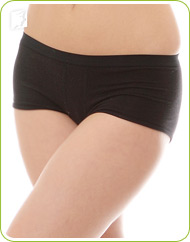
Incontinence, an inability to control one's bladder, has three types: stress incontinence, which is the accidental release of urine while laughing or sneezing; urge incontinence, which is the sudden urge followed by an uncontrollable loss of urine; and overflow incontinence, which is the absence of the sensation of a full bladder, leading to leakages.
Did You Know? Almost half of women in their mid-40s suffer from incontinence problems.
What to Do for Incontinence?
- Finding Relief: Opt for foods rich in phytoestrogens, magnesium, and fiber; strengthen your pelvic floor muscles with regular exercise, and alleviate stress with breathing techniques. Maintain proper hydration while practicing bladder training for improved control.
- Treatment Options: The symptoms of incontinence can be reduced with natural methods, such as phytoestrogenic and hormone-regulating supplements, or conventional methods, including medications, like bladder relaxants or HRT (beware of side effects), and surgery.
Bloating
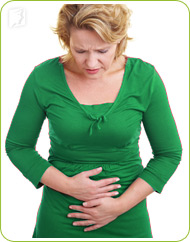
Bloating, a feeling of fullness or tightness in the abdominal area, can cause a great deal of discomfort and pain. It can be accompanied by increased burping or flatulence. Common throughout women's lives, bloating tends to intensify as they go through the menopausal transition in the mid-40s.
Did You Know? Bloating affects up to 60% of menopausal women.
What to Do for Bloating?
- Finding Relief: Eat foods rich in fiber, phytoestrogens, and potassium, while avoiding gas-causing foods, like broccoli or cabbage; exercise regularly to improve digestion, and drink plenty of water for optimal gut function. Also, try herbal infusions, like those with anise or oregano, for quick symptom relief.
- Treatment Options: You can treat the symptoms and causes of bloating with alternative medicine, which consists of herbal supplements that regulate hormones, or conventional medicine, like antacids or HRT (might cause side effects).
Allergies
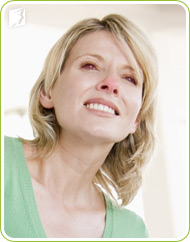
Allergies result from an abnormal reaction of the immune system to substances that are typically harmless to most people, such as pollen or dust. The severity of allergies can vary from mild, characterized by itchy eyes, runny nose, and sneezing, to extreme, which include swelling, dizziness, or difficulty breathing and are a medical emergency.
Did You Know? It is common for women to develop allergies during menopause, even if they never had them before.
What to Do for Allergies?
- Finding Relief: Load up on phytoestrogens, vitamin C, and probiotics; lower stress and boost immunity with yoga or meditation; and avoid allergens and unhealthy habits, like smoking. For rapid relief, try saline nasal spray, steam inhalations, and herbal infusions.
- Treatment Options: Natural methods for treating allergies consists of phytoestrogenic and hormone-regulating supplements, like red clover or Macafem; whereas, conventional methods include anti-histamines, immunotherapy, or HRT (potential side effects).
Brittle Nails
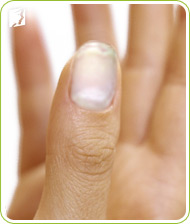
Weak and prone-to-breaking nails are women's common complaint during the menopausal transition. Brittle nails might not only chip or split easily, but also have significant changes in their appearance, including surface ridges, curling, or discoloration.
Did You Know? Nails become brittle when the menopausal estrogen drop affects keratin production.
What to Do for Brittle Nails?
- Finding Relief: Focus on foods rich in phytoestrogens, calcium, and vitamin B7; drink plenty of water to prevent dehydration, and reduce stress with regular exercise or meditation. Practice good hand hygiene by using natural products, moisturizing often, and avoiding harsh chemicals.
- Treatment Options: Tackling brittle nails is possible with alternative methods, such as herbal supplements that cause little no side effects or with conventional methods, or HRT, which might cause serious adverse reactions.
Changes in Body Odor
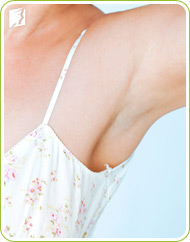
Unpleasant body odor and excessive sweating can make the menopausal women experiencing them very self-conscious. This bothersome symptom can be further worsened by other menopause symptoms, such as hot flashes or night sweats, which cumulatively affect a woman's self-confidence and sense of freshness.
Did You Know? Between the two types of sweat glands, eccrine and apocrine, only the latter produce smelly sweat.
What to Do for Body Odor?
- Finding Relief: Compose your meals with foods rich in phytoestrogens, zinc, and magnesium; exercise for hormonal balance and stress reduction; and avoid triggers, such as spicy foods, smoking, or alcohol. Keep proper body hygiene; wear breathable fabrics, and use herbal toiletries.
- Treatment Options: Women can choose between alternative treatment options, including natural, hormone-balancing supplements, or conventional treatment options, including medicated deodorants; medications, like HRT (serious side effects); or surgery.
Irregular Heartbeat
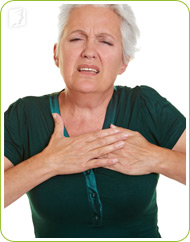
Having an irregular heartbeat is one of the most alarming menopause symptoms. Characterized by fluttering or pounding in the chest and often followed by dizziness and shortness of breath, it may lead women to think that they are having a heart attack. Though unpleasant, menopausal arrhythmias are generally not serious.
Did You Know? The term tachycardia refers to a heart rate over 100 beats per minute, while bradycardia is a heart rate slower than 60 beats per minute.
What to Do for Irregular Heartbeat?
- Finding Relief: Eat foods rich in omega-3s, magnesium, potassium, and phytoestrogens; strengthen the heart with regular exercise, and relieve stress with a goodnight's sleep or mindfulness. For immediate relief, try slow breathing exercises, vagal maneuver, or forceful coughing.
- Treatment Options: Alternative approaches to treating irregular heartbeat consist of herbal supplements known to bring about hormonal balance; whereas, conventional treatments include anti-arrhythmia medications, HRT (beware of side effects), or surgery.
Depression
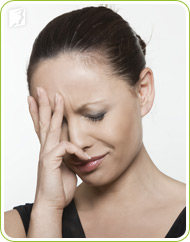
Although occasional blues are natural throughout life, a prolonged sadness that impairs a woman's daily life may signal depression. It is characterized by psychological and physical symptoms, including persistent sadness, emptiness, and low self-esteem as well as fatigue, low energy, and appetite changes.
Did You Know? Depression is four times more likely among menopausal women than in those in other life stages.
What to Do for Depression?
- Finding Relief: Add more phytoestrogenic, probiotic, and vitamin B-rich foods to your diet; exercise to boost serotonin and endorphin release; and practice yoga for relaxation. Try to maintain social life by having friends, volunteering, or partaking in local support groups.
- Treatment Options: Depression can be tackled naturally with phytoestrogenic and hormone-regulating supplements or conventionally with psychotherapy or medications, such as antidepressants, mood stabilizers, or HRT (be cautious of side effects).
Anxiety
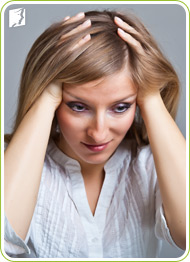
Anxiety is a feeling of excessive and persistent worry, tension, and nervousness, often accompanied by physical symptoms, including heart palpitations, shortness of breath, and excessive sweating. There are several types of anxiety disorders, each with its own causes and characteristic features.
Did You Know? Anxiety is twice as common in women as it is in men.
What to Do for Anxiety?
- Finding Relief: Eat foods rich in phytoestrogens and tryptophan; promote good mood with regular exercise, and practice yoga or meditation to control stress and anxiety. Also, learn to identify and avoid triggers, and give calming herbal infusions or aromatherapy a try.
- Treatment Options: Alleviating anxiety symptoms can be achieved with alternative approaches, including natural supplements that promote hormonal balance, or conventional approaches, like psychotherapy or medications, such as antidepressants, anxiolytics, sedatives, or HRT (high risk of side effects).
Irritability
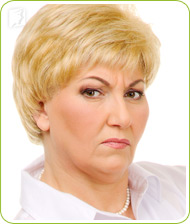
It is not uncommon for menopausal women to report feeling irritable or “on edge” without obvious triggers. Irritability is a state characterized by feeling annoyed, having reduced patience and tolerance, and lashing out in anger or frustration over matters that may seem trivial to others.
Did You Know? Up to half of women in their mid-40s struggle with irritability during menopause.
What to Do for Irritability?
- Finding Relief: Eat phytoestrogenic and serotonin-boosting foods; stay physically active to promote good mood, and avoid stressors with yoga and good quality sleep. For quick relief, do deep breathing exercises, or try relaxing herbal infusions and aromatherapy.
- Treatment Options: Treating irritability is possible through natural approaches, consisting of safe and effective herbal supplements that balance hormone levels, or conventional approaches that might carry serious side effects, like antidepressants, mood stabilizers, or HRT.
Panic Disorder

Being one of the scariest and most debilitating menopause experiences, panic disorder consists of episodes of sudden and overwhelming fear and anxiety. These intense feelings can trigger physical symptoms, such as heart palpitations, shallow breathing, trembling, and dizziness.
Did You Know? Panic attacks are triggered as low estrogen leads to increased cortisol (“stress hormone”) and decreased serotonin (“happy hormone”) levels.
What to Do for Panic Disorder?
- Finding Relief: Load up on phytoestrogens, probiotics, and vitamin B12; boost serotonin production with regular exercise, and practice yoga or meditation to reduce stress. During the day, try calming affirmations, deep breathing exercises, and infusions with calming herbs.
- Treatment Options: Alternative treatment options for panic disorder offer a number of phytoestrogenic and hormone-regulating herbal supplements. On the other hand, conventional treatments entail psychotherapy or medications, like anxiolytics, antidepressants, or HRT (possible side effects).
Pains
Breast Pain
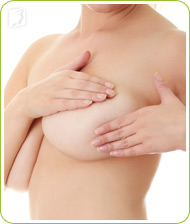
Breast pain, or breast tenderness, includes having feelings of discomfort in one or both breasts. Although it might understandably be a source of worry, cyclical breast pain results from hormonal changes during the menopausal transition and does not indicate serious underlying problems.
Did You Know? As many as 70% of women report having breast pain at some point in their lives.
What to Do for Breast Pain?
- Finding Relief: Consume foods rich in phytoestrogens, omegas, and vitamins B and E; focus on low-impact exercises, like yoga or Pilates; and wear well-fitted and supportive bras. For immediate relief, try applying ice compresses in case of swelling and warm compresses in case of pain.
- Treatment Options: Breast pain can be approached naturally with herbal supplements that promote hormonal balance or conventionally with prescription creams, pain-relieving pills, or HRT (caution advised due to side effects).
Headaches
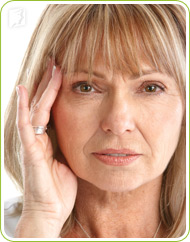
Continuous pains in various regions of the head can become serious disruptions in a woman's everyday life, often disabling her for days to come. Headaches or migraines can have many faces, ranging from throbbing and pulsating pain to sensitivity to light and nausea.
Did You Know? Depending on the type, headaches can last from 10 minutes to several days.
What to Do for Headaches?
- Finding Relief: Maintain proper nutrition with foods rich in vitamin B12, magnesium, and phytoestrogens; keep yourself well hydrated; and relieve tension and stress with exercise or quality sleep. Try scalp massage, cold or hot compresses, or deep breathing exercises to reduce the symptoms.
- Treatment Options: Headaches can be treated with alternative medicine, including natural supplements that resolve hormonal imbalance, or conventional medicine, consisting of over-the-counter or prescription painkillers, anti-seizure pills, or HRT (serious side effects).
Joint Pain
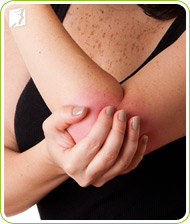
Joint pain is soreness, stiffness, or swelling in or around the joints in various parts of the body, which is unrelated to trauma or exercise. Among middle-aged women, painful joints are caused by a state of inflammation triggered by low estrogen levels.
Did You Know? Women are 10 times more likely than men to suffer from joint pain in the hands.
What to Do for Joint Pain?
- Finding Relief: Eat a diet rich in phytoestrogens, omegas, calcium, and vitamin K2 and D; focus on low-impact exercises to maintain flexibility and optimal weight; and avoid a sedentary lifestyle. For immediate relief, apply warm compresses for pain and stiffness or cold compresses for swelling and inflammation.
- Treatment Options: You may alleviate joint pain with natural approaches, including phytoestrogenic and hormone-regulating supplements, or conventional approaches, such as physical therapy, anti-inflammatory drugs, steroids, or HRT (watch out for side effects).
Burning Tongue
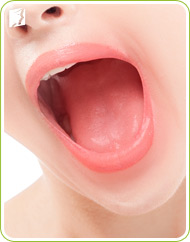
Burning tongue, also known as burning tongue syndrome, is one of the most bizarre menopause symptoms. Women report having a sore, dry, itchy, and tingling tongue or lips. Taste changes, including a constant metallic taste in the mouth, are common as well.
Did You Know? Up to 40% of women between the ages of 45 and 55 suffer from burning tongue syndrome.
What to Do for Burning Tongue?
- Finding Relief: Opt for foods rich in phytoestrogens, zinc, iron, and vitamin B12; drink six to eight glasses of water daily, and avoid spicy or salty foods and unhealthy habits. To relieve the pain, suck on ice cubes; use herbal mouth rinses; or apply natural, pain-relieving gels.
- Treatment Options: Treating burning tongue is possible with alternative medicine, which involves hormone-balancing herbal supplements, or conventional medicine, like painkillers, prescription saliva substitutes, or HRT (possible side effects).
Electric Shock Sensation
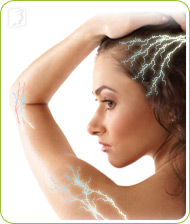
Electric shocks are unpleasant or painful sensations in various parts of the body characterized by jolt-like stabs or sharp impulses. These electric zaps can take women by surprise and occur in the skull, pierce through the neck, or cause pins and needles in the back.
Did You Know? Lhermitte's sign is the term for electric shocks starting at the neck and running down the spine.
What to Do for Electric Shock Sensation?
- Finding Relief: Up your consumption of foods rich in phytoestrogens, B12, magnesium, and potassium; improve circulation and flexibility with regular exercise, and maintain a healthy weight. Also, avoid a sedentary lifestyle and disc compression by stretching frequently throughout the day.
- Treatment Options: To reduce the occurrence of electric shocks, try alternative medicine, including herbal supplements for optimal hormonal balance, or conventional medicine, such as physical therapy or HRT (caution for side effects).
Digestive Problems
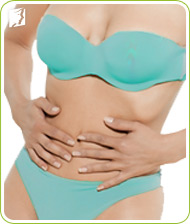
Digestive problems can affect any part of the digestive tract, from the esophagus to the anus. They can cause a variety of bothersome symptoms, like cramps, bloating, nausea, constipation, or diarrhea. Although common throughout life, digestive problems in menopause are caused by natural hormonal changes.
Did You Know? Women are twice as likely as men to suffer from digestive issues.
What to Do for Digestive Problems?
- Finding Relief: Eat a balanced diet with fiber, probiotics, and phytoestrogens; improve gut function with regular exercise, and reduce accumulated stress with mind-body techniques. For acute relief, try herbal remedies, such as infusions or decoctions.
- Treatment Options: Digestive problems can be relieved with natural approaches, which involve phytoestrogenic and hormone-regulating supplements, or conventional approaches, which consist of laxatives, antacids, anti-diarrhea pills, or HRT (high risk of side effects).
Gum Problems
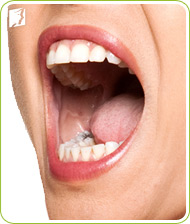
Medically known as gingivitis, gum disease develops when bacterial growth in the mouth leads to inflammation of the gums that can spread to the jawbones. Common symptoms include pain, increased sensitivity, swelling, and pus. If left untreated, gum problems can lead to tooth loss, periodontitis, and heart disease.
Did You Know? Around 68% of gingivitis sufferers are women.
What to Do for Gum Problems?
- Finding Relief: Eat foods full of phytoestrogens, calcium, probiotics, and vitamin C; maintain good oral hygiene with regular brushing and dental check-ups; and quit smoking or chewing tobacco. To reduce the pain, suck on ice cubes; apply herbal gels; or use natural, antiseptic gargles.
- Treatment Options: Resolving gum problems is possible with alternative medicine, which includes herbal supplements that promote hormonal balance, or conventional medicine, consisting of medications, like antibiotics, antiseptic chips, or HRT (beware of side effects), or surgery.
Muscle Tension
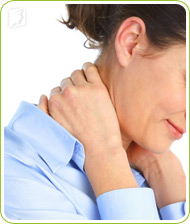
Muscle tension is an often painful sensation of the muscles being tight or strained in various parts of the body, most commonly in the neck, back, and shoulders. Tense muscles lead to an increase in aches, pains, soreness, and stiffness throughout the body, affecting a woman's mobility and making it difficult to stay active.
Did You Know? Muscle tension occurs when low estrogen levels lead to a rise in the stress hormone, cortisol.
What to Do for Muscle Tension?
- Finding Relief: Consume foods rich in phytoestrogens, magnesium, potassium, and iron; release tension with regular exercise; and practice stress-reduction techniques to alleviate the symptoms. Remember that frequent stretching, good rest, and heating or ice packs can bring effective relief.
- Treatment Options: Tackling muscle tension with alternative medicine, such as herbal supplements, can reduce the symptoms and cause little to no side effects. Conventional treatments, on the other hand, are limited and include pain relievers and HRT, which involves the most risk.
Itchy, Crawly Skin
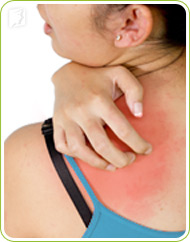
Medically known as pruritus, itchy skin is an unpleasant sensation in various parts of the body followed by an urge to scratch. Oftentimes, it is one of the first menopause symptoms to appear because collagen loss is most rapid at the beginning of menopause.
Did You Know? Menopausal women might also experience other skin issues, like acne, pigment changes, and more.
What to Do for Itchy Skin?
- Finding Relief: Eat foods rich in phytoestrogens, omegas, and vitamins B, C, and E; drink plenty of water to hydrate the skin, and exercise to reduce stress and improve circulation. Also, don't forget about exfoliating properly, frequent moisturizing, and relieving the itch with cold compresses and herbal gels.
- Treatment Options: Root causes of itchy skin can be treated with alternative medicine, involving phytoestrogenic and hormone-balancing herbal supplements, or conventional medicine, such as anti-itch gels, anti-histamine creams, and HRT (be mindful of side effects).
Tingling Extremities
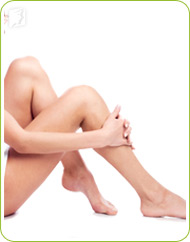
Tingling extremities, scientifically termed paresthesia, are unsettling sensations characterized by numbness, increased sensitivity, and pins and needles in the limbs. Although menopausal tingling extremities are usually harmless, they can cause a great deal of discomfort and misery.
Did You Know? Some women also experience “formication,” which is a false sensation of insects crawling on the skin.
What to Do for Tingling Extremities?
- Finding Relief: Balance your diet with foods rich in phytoestrogens, calcium, magnesium, and vitamin B12; focus on low-impact exercises to improve circulation, and practice stress-reduction techniques. Also, maintain good posture and proper sleeping positions; wear comfortable shoes, and stretch often during the day.
- Treatment Options: Alternative approaches to treating tingling extremities include herbal supplements, such as red clover, ginseng, Macafem. Conventional approaches consist of physical therapy, therapeutic massage, or medications, like anti-seizure pills or HRT (possible side effects).
Others
Osteoporosis
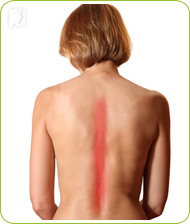
Osteoporosis is a degenerative bone disorder, characterized by thinning and weakening of the bone and a general decrease in bone mass and density. Because estrogen plays a role in calcium absorption into the bones, its drop makes them more susceptible to breaks.
Did You Know? About 33% of women over 50 experience bone fractures as a result of osteoporosis.
What to Do for Osteoporosis?
- Finding Relief: Consume a diet rich in calcium, vitamin D, protein, and phytoestrogens; lower stress with mind-body techniques, and exercise regularly to keep a healthy weight and strong bones. To prevent fractures, wear well-fitted, flat shoes; take your time on the stairs; and remove loose rugs.
- Treatment Options: Osteoporosis can be treated with alternative medicine, which consists of herbal supplements promoting hormonal balance, or conventional medicine, including prescription medications or HRT (beware of side effects).

